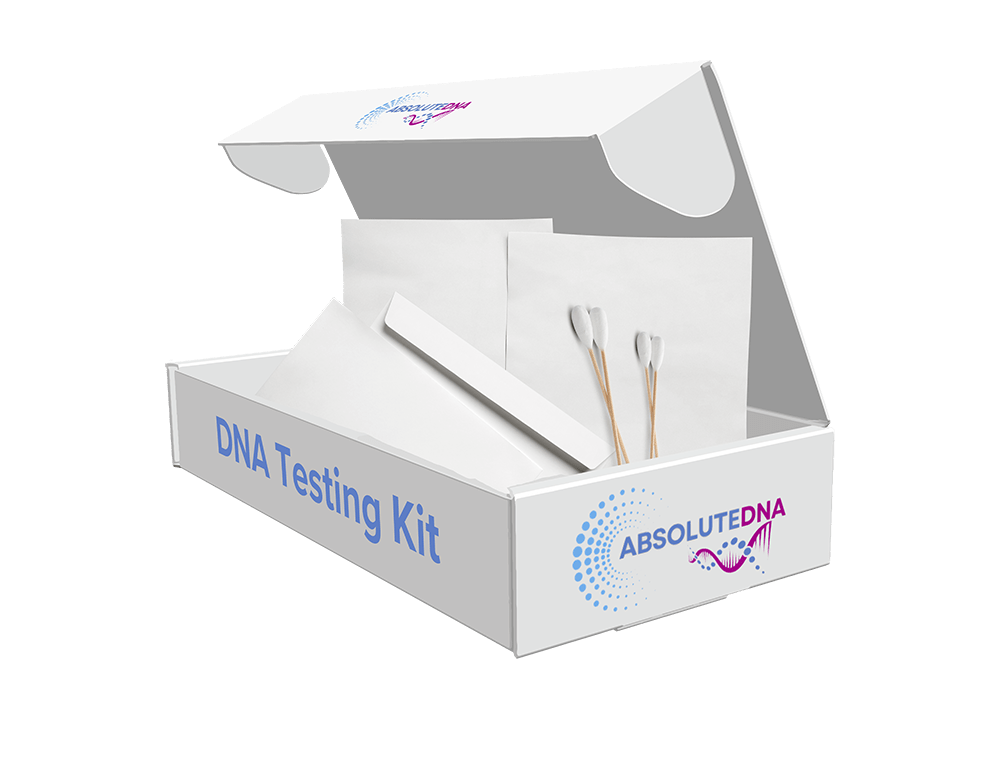The Ordering Process — Simple
Ready to learn more about your dog’s genetics? Absolute DNA Services has streamlined the process for the Advanced Canine Health Genetic Screening, so it’s as easy as:
- Order your test: Use our straightforward online checkout system.
- Collect the sample: We’ll send you everything you need.
- Send it back: Use the included envelope to return your sample to our lab in Brisbane, Australia.
- Receive results: Expect an email with your results in 4-6 weeks.
By understanding your dog’s genetic health, you can make informed decisions that enhance their wellbeing and potentially prevent the transmission of inheritable conditions.
About Absolute’s Advanced Canine Screening
Humans and dogs have shared a special bond as companions, family members, and best friends for centuries. Today, scientific breakthroughs have made it possible to uncover the genetic underpinnings of the complex health issues our canine companions face. Our user-friendly, at-home test kit enables you to screen your dog for various genetic markers linked to inherited diseases and traits. This includes features like coat colour and hair length.
Understanding your dog’s unique genetic makeup helps you provide the best possible care throughout their life. Knowing if they are at risk for genetic conditions allows for early intervention and better management, potentially preventing these conditions from being passed on to their offspring through selective breeding.
What Does The Canine Genetic Screening Include?
Note: This test does NOT identify your dog’s breed.
The test analyses 154 genetic markers, pinpointing gene variants linked to 134 prevalent inherited disorders, including:
- Ophthalmic Disorders: Eye-related issues.
- Dental Disorders: Problems affecting teeth and gums.
- Neurological Disorders: Nervous system issues.
- Immunological Disorders: Immune system dysfunctions.
- Endocrine Disorders: Hormonal imbalances.
- Skeletal Disorders: Bone abnormalities.
- Respiratory Disorders: Breathing problems.
- Hepatological Disorders: Liver conditions.
- Dermatological Disorders: Skin problems.
- Metabolic Disorders: Metabolism or enzyme irregularities.
- Hematological Disorders: Blood disorders.
- Gastrointestinal Disorders: Digestive system problems.
- Muscular Disorders: Muscle dysfunctions.
- Renal Disorders: Kidney and urinary issues.
The panel also explores 21 variants affecting physical traits like coat, hair, and tail features. Please see our detailed list here.
How Can Genetic Screening Benefit My Dog?
Genomic screening identifies if your dog carries genes that could lead to health issues covered by the test. This crucial information can guide breeding decisions to minimize the risk of passing on such disorders. It also assists your vet in managing and treating conditions early on, safeguarding your dog’s long-term health.
Upon receiving your report, you’ll find an easy-to-read summary of the findings, including traits your dog might pass to any puppies and any detected genetic changes linked to specific conditions. Details on whether your dog is a carrier and the potential impact on future litters will also be provided.
Understanding Genetic Disorders
A genetic disorder stems from a mutation in a gene, which can be inherited or occur spontaneously. Approximately 400 inherited disorders have been identified in dogs, affecting various bodily functions such as vision, skin health, and immune response.
How Are Genetic Disorders Inherited?
Genetic traits and disorders are passed from parents to puppies via genes. Each puppy receives one gene copy from each parent. Modes of inheritance include:
Autosomal Dominant
Only one mutated gene copy is necessary for the dog to be affected.
Autosomal Recessive
The dog must have two mutated gene copies to be affected.
X-linked
Linked to mutations on the X chromosome, affecting males more severely.
Some genetic traits are influenced by multiple genes and environmental factors, and not all inheritance patterns are fully understood.
Carrier Status
If a dog is a “carrier,” it means they have one mutated gene copy related to a disorder but show no symptoms. In autosomal recessive conditions, two copies of the mutation are required for the dog to be affected. Carriers have a 50% chance of passing the mutation to their offspring.
Sample Collection & Testing Process
A simple mouth swab is all we need for the test. Once you order, we’ll send you a kit for sample collection, which you can easily use at home and send back to us with the included prepaid envelope.

